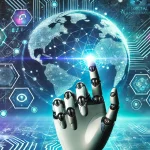Introduction
Public trust has become one of the most valuable yet fragile currencies in the 21st century. As artificial intelligence, global leadership, and celebrity influence reshape communication, the meaning of truth and authority is constantly evolving. The digital landscape no longer relies solely on facts—it thrives on perception, visibility, and influence.
This convergence of technology, fame, and governance defines how people form opinions, engage with information, and participate in democracy. The challenge is not only to inform but to maintain integrity in an era where reality is algorithmically curated and amplified through emotion.
Artificial Intelligence and the New Information Hierarchy
Artificial intelligence has revolutionized how news and narratives are created, distributed, and consumed. Algorithms select what people see, predicting preferences based on data patterns. This automated system of content curation forms a new hierarchy of information where AI decides what becomes relevant.
While this technology enhances efficiency, it also narrows perspectives. By reinforcing user biases and personalizing content, AI risks creating echo chambers that distort public understanding. The key lies in developing transparent systems that promote diversity of thought and factual integrity.
Global Leaders and the Politics of Digital Diplomacy
Global leaders now govern not only through policies but through digital personas. Social media platforms have become modern diplomatic arenas where statements, apologies, and strategies unfold in real time.
The immediacy of digital diplomacy builds connection but also invites scrutiny. A single tweet or post can influence markets, provoke protests, or alter international relationships. The evolution of leadership now requires not just vision but digital literacy and restraint.
Celebrities as Voices of Global Conscience
Celebrities have taken on new roles as ambassadors of social awareness, humanitarianism, and digital advocacy. Their influence transcends entertainment, shaping conversations on sustainability, equality, and mental health.
However, the power of celebrity influence carries both promise and peril. While many use their visibility to advance noble causes, others exploit activism as branding. The measure of authenticity defines how effectively they build public trust in a cynical, media-saturated world.
Technology’s Role in Public Perception
Technology now dictates how trust is earned, maintained, or lost. Livestreams, AI-generated media, and digital transparency have made every public figure accountable in real time. Yet, the same tools that promote openness also enable manipulation.
Deepfakes and misinformation campaigns threaten to blur the line between reality and illusion. The ability to distinguish genuine voices from fabricated ones will define the credibility of future communication.
The Business of Influence
Influence has become an industry—measured in clicks, shares, and engagement rates. Corporations and political movements alike invest heavily in personalities and platforms to win public attention.
This monetization of influence transforms authenticity into a commodity. As fame and finance intertwine, society must question whether influence serves awareness or profit, and how ethical boundaries can be upheld in digital capitalism.
Building Digital Ethics for a Trust-Based Future
To restore and sustain public trust, global institutions, tech companies, and individuals must adopt ethical principles for the digital age. Transparency, accountability, and education are essential in navigating a world driven by algorithms and appearances.
Citizens must be empowered to question, verify, and engage critically with digital information. Trust cannot be programmed—it must be earned through responsibility and truth.
FAQs
How does AI influence public opinion?
AI shapes what people see and read by curating personalized content, often reinforcing pre-existing beliefs.
Can celebrities influence global political agendas?
Yes, their reach and advocacy can raise awareness, pressure leaders, and shape international dialogue.
Why is digital diplomacy important today?
It allows leaders to communicate instantly with citizens and other nations, but it also increases risks of miscommunication.
How can misinformation be controlled online?
Through stronger fact-checking systems, transparent algorithms, and media literacy education.
What role does technology play in rebuilding public trust?
Technology must prioritize authenticity, accountability, and equitable information access over engagement metrics.
Conclusion
The interplay between AI, celebrity culture, and global politics has created a world where influence is both a tool and a test of integrity. The power to inform now rests with those who can balance visibility with truth.
As society moves deeper into the digital age, the future of trust will depend on how responsibly technology is used to shape perception. When influence serves honesty rather than manipulation, the digital world can evolve into a realm of genuine connection and enlightened discourse.






